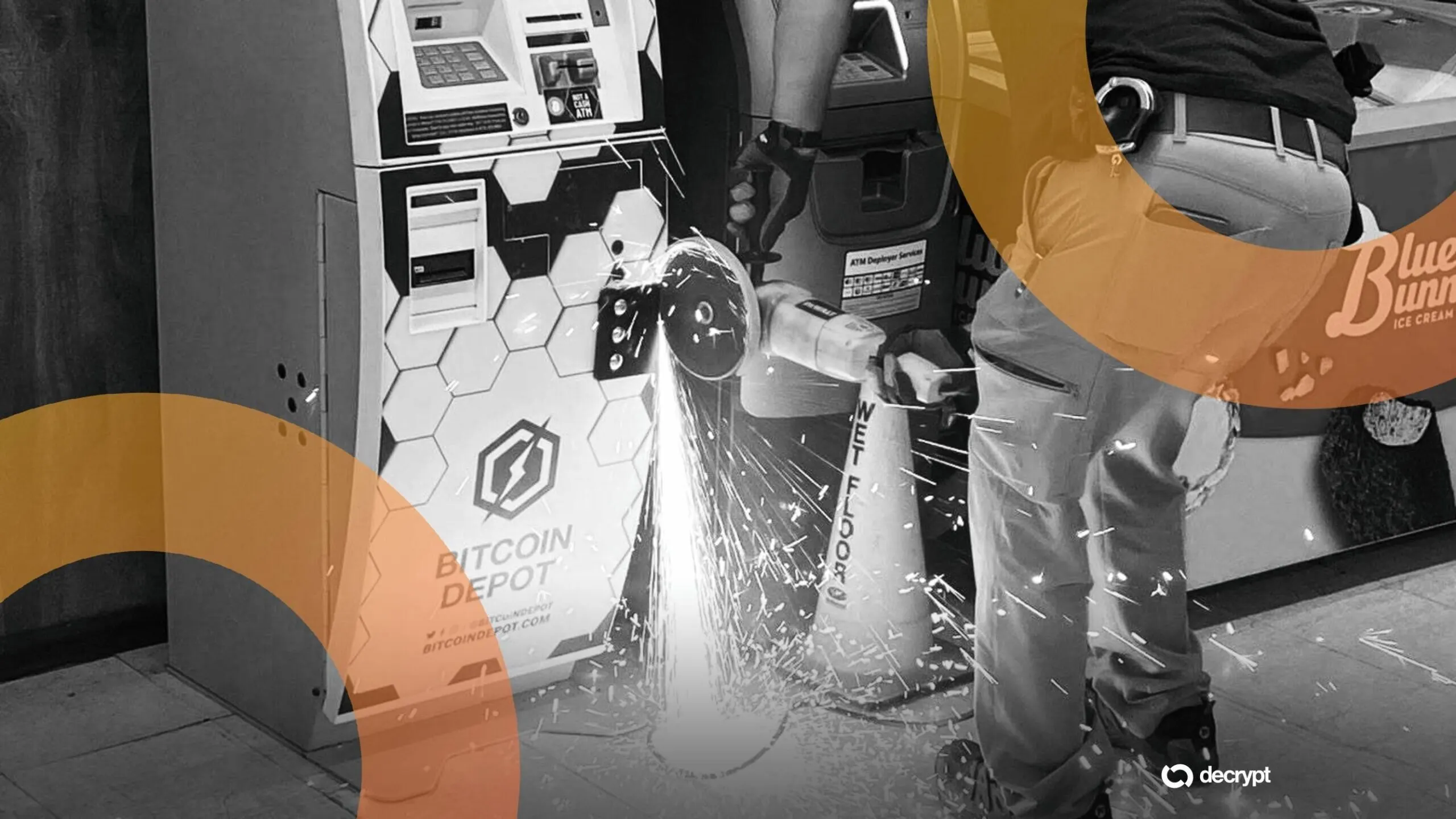In brief
- Police are occasionally using brute force to retrieve cash from Bitcoin ATMs.
- The funds belong to company's like Bitcoin Depot, the firm's CLO said.
- In 2024, Americans lost at least $247 million through crypto kiosks, an FBI report found.
U.S. law enforcement officials using brute force to seize cash from Bitcoin ATMs are overstepping their authority and may be violating the law, Bitcoin Depot CLO Chris Ryan said.
Ryan told Decrypt that funds police may seize rightfully belong to the Atlanta, Georgia-based provider of Bitcoin ATMs, and that they are liable for damages to the machines, even as they try to return large sums to consumers who say they’ve been scammed.
“You’ve got these rogue law enforcement officers thinking that they’re doing the right things by these consumers,” Ryan said. “What they’re actually doing is creating another victim, which is us, with the damage of our property and seizing of our funds.”
Last week, authorities in Texas used power tools to retrieve $32,000 from a Bitcoin Depot kiosk. Because law enforcement cut into “the actual body of the kiosk,” the machine will have to be completely replaced, according to Bitcoin Depot COO Scott Buchanan. A Bitcoin Depot kiosk costs $14,000 under a profit-sharing program, according to the firm’s website.
“In most cases, where [cops are] just physically breaking in, they just total [the machine],” Buchanan told Decrypt.
If authorities are trying to seize funds from a Bitcoin Depot kiosk, the company will always unlock the machine, Buchanan said. In the event that Bitcoin Depot’s property is damaged, the company will request that law enforcement foot the bill, but municipalities often “don’t have the resources to provide restitution,” Ryan said.
“It’s not the norm that we would get anything back,” he said.
Jasper County Sheriff Chuck Havard directed Decrypt to a department Facebook post, saying that he is not able to discuss the incident that has since become “pending litigation.”
Scammers leverage Bitcoin ATMs, and the irreversible nature of crypto transactions, to defraud people of hard-earned funds, often impersonating government or banks. In 2024, Americans lost at least $247 million through crypto kiosks, up 31% from 2023, an FBI report found. Once a scammer receives a victim’s Bitcoin, it’s difficult to recover those funds.
When a customer uses a Bitcoin ATM, they insert cash into the machine. Then, Bitcoin Depot says it sells a requisite amount of Bitcoin directly to the user. To complete the transaction, a user must provide a wallet address that will receive the Bitcoin. Scammers will often provide a victim with an address, in hopes of receiving the Bitcoin that a customer just bought.
Bitcoin Depot feels “terrible for these people that are being scammed,” but the company is entitled to keep the cash, Ryan said, adding that some cops don’t understand the company’s business model, or the fact that it’s customers’ Bitcoin that is actually effectively being stolen.
“Once that transaction is completed, when the user inserts their cash and their crypto is funded into the wallet of their choosing, that ends our involvement in the transaction,” Ryan said.
Confusion can arise in court when authorities present warrant requests portraying victims’ lost cash as the proceeds of a crime, and not the Bitcoin that scammers have absconded with. Law enforcement will seize funds from Bitcoin Depot kiosks up to 20 times in a given year, Ryan said, noting that most instances don’t involve brute force.
“You have another subset that just doesn't go through the warrant process at all,” Ryan added. “They’ll call us and they’ll say, ‘We’re about to break into your machine.’”
Each state has its own laws, but the Iowa Supreme Court ruled in two cases this year that Bitcoin Depot was entitled to victims’ cash. That’s because, under the company’s terms and services, depositors must say that they own the digital wallet receiving Bitcoin. Using the machine, Bitcoin Depot also warns that addresses provided by third parties could be scams.
A Bitcoin Depot spokesperson told Decrypt that the firm “has successfully defended similar unlawful actions by law enforcement” in North Carolina, Virginia, Massachusetts, Louisiana, and Washington as well. Some lawsuits involving seized funds, like one filed by Bitcoin Depot against Wood County in Wisconsin, are settled before they make it to trial.
The Internet Crimes Complaint Center, or IC3, a division of the FBI, issued a PSA in 2021 warning that fraud cases involving crypto ATMs were on the rise, warning that near-instantaneous settlement “can leave many victims with a financial loss.”
In most fraud cases involving Bitcoin ATMs, it’s “impossible to get the money back,” Pennsylvania Attorney General Dave Sunday warned in a consumer alert in February.
Bitcoin Depot says it partners with local law enforcement to track victims’ crypto, tapping the crypto analytics firm Elliptic as a way to offer them transaction tracing tools. The company also has a team, including former law enforcement, to coordinate with local authorities, explain the business, and help victims properly file a complaint with the FBI’s IC3.
“The ‘smash and grab’ destruction of our property [is] thankfully not the majority of these types of actions,” Ryan said. “They don’t really understand how crypto works, generally, so we're doing the best we can to help them out, outside of all of our other responsibilities.”
Edited by James Rubin

